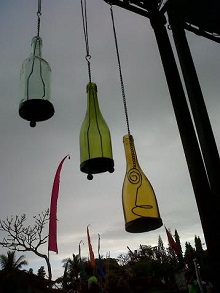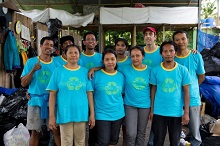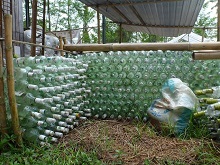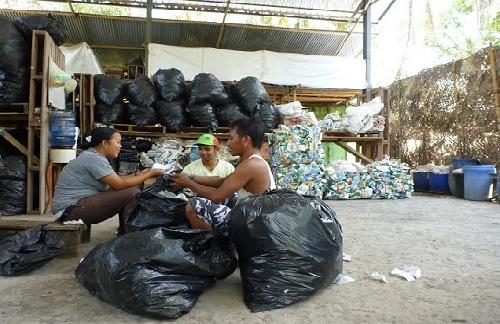The Bali Recycling company (now: KONO), Creating valuable resources from waste
Bali’s tourism and urban development industry growth is choking the island as it produces over 10,000 tons of waste every day. Waste is being mismanaged and illegally dumped into rivers and streams, it’s having detrimental effects on the environment, the health of the local communities, and Bali’s future ability to attract tourists. Founder Olivier Pouillon discusses his journey with Bali Recycling, the only fully licensed company that handles all types of waste, and offers recycling services in Bali, Indonesia.
What is the core value proposition of your business?
Tourism is the number one employer and foreign currency generator for Indonesia and as a result the Government is looking to increase tourist numbers tenfold in the coming years. While this is great for the economy, it is having a pervasive impact on the environment. The lack of a proper waste management system is of particular concern. There is no infrastructure to deal with the tons of waste that is generated by the tourist industry. Bali, in particular, is marketed as a beautiful tropical island but what most tourists don’t realise is the huge amount of waste that they generate lands up in the rivers, the sea, and on the side of the road.
Our whole enterprise relies on turning that problem into an opportunity. We believe waste is a resource. Since there is absolutely no infrastructure in place, we have set up a full waste service system in Bali where we collect, process, recycle and dispose of the unrecyclable material. We aim to provide a full fledged service at the highest standard to prove that it is possible to run a waste recycling company that is both profitable and cleans up the environment.
What has really been successful for us has been our Upcycling business. We realised how many glass bottles were coming in to our processing unit and saw an opportunity there to make more money and take advantage of the fact that we’re in the handicraft centre of Indonesia and people come here to buy interesting products. Usually recycling involves converting materials and products into new materials of lesser quality often referred to as downcycling whereas upcycling converts material into products of higher value. So we started making various re-sellable items out of glass bottles, plastic films and bags.

Our current revenue is around $5,000 a month. The business is profitable despite us taking two and a half years to figure out how to do things properly. We now know we can scale up and be successful, we just need the resources to do it.
Who are your customers? How do they use your service and what feedback have you received from them?
I first started working with waste in Bali in the mid-1990s with the Wisnu Foundation. Even back then, there was a massive waste problem. Five star hotels would generate a huge amount of waste because of the influx of tourists but this waste would just be dumped in a field nearby. We started working with hotels to collect their waste, process it and dispose of it properly.
In 2010, when I set up Peduli Bali in the northern area of Ubud, I realised quickly that the same model wouldn’t work. Hotels just weren’t willing to pay for waste disposal. They just didn’t care where their waste was going. So we had to adapt and started to focus on local businesses and restaurants who actually realised it was in their interest to make sure waste was managed properly because in the long run if the place was dirty and filled with waste, their business would suffer.
So we go to the businesses, teach them how to sort their waste, and collect it from them. They pay us to do this and at the end of every month we give them a recycling report so that they know exactly how much waste they’re generating and how it is being recycled. This actually serves the purpose of making businesses realise how much unnecessary waste they are producing so we are actually educating them at the same time.
Our other main customers are local Indonesian home owners who we pay to take their waste off them. This demonstrates to them how valuable the waste is and motivates them not to just dump it. Explaining to them that they are saving the environment doesn’t work but if they realise they are throwing money away, that tends to work! We end up paying people between $10-$15 a month to take their waste away which is a lot of extra cash for people here.
What has been the most challenging aspect of starting and running your inclusive business?
We made a couple of mistakes in the beginning transferring a model in the South that obviously wasn’t working in the North with the hotels. We made this assumption that we could just use that model and tried to push it instead of tweaking our model. Once we realised we needed to do that, we came up with all sorts of ideas like the upcycling that are now making us successful You have to fully understand the different aspects of the business and make difficult decisions. You have a hard time letting go of your assumptions but we’ve learnt that you have to accept when things aren’t working and move on.
What is the one factor that has most enabled your inclusive business to progress this far?
Getting my wife who is a local Indonesian involved in the business has been critical. We wouldn’t be around if it wasn’t for her. There are so many local factors here that I just don’t understand and she has been able to navigate them as an Indonesian.
What role can inclusive businesses like yours play in helping the developing world combat climate change?
Waste is the most basic environmental issue. If you want people to get engaged in cleaning up the environment you have to show them how day to day issues will affect them. This has to happen at the grassroots level where businesses like ours are operating.
In 2009, when the climate conference took place in Bali, all these NGOs descended on the island to make their presence felt but when I tried to make them aware of what was happening with waste in the country, they just didn’t want to listen. During the conference, you could actually see posters that these NGOs had been waving at delegates just dumped in fields. It was pathetic. And clearly demonstrates the scale of the problem – even major environmental actors aren’t willing to get involved in local problems, they just want to talk about the overarching issues.
What is the one piece of advice you would give to entrepreneurs looking to start an inclusive business?
You have to jump in. I wish I had started years ago. The only way you’re going to know if you’re cut out for social entrepreneurship is if you just go ahead and do it. The earlier you start, the more of an impact you can make.


